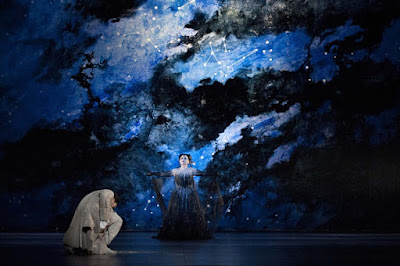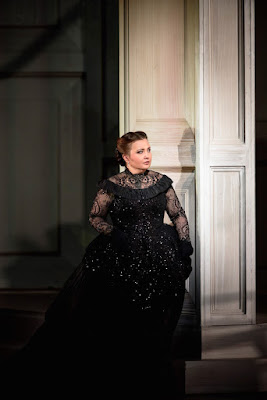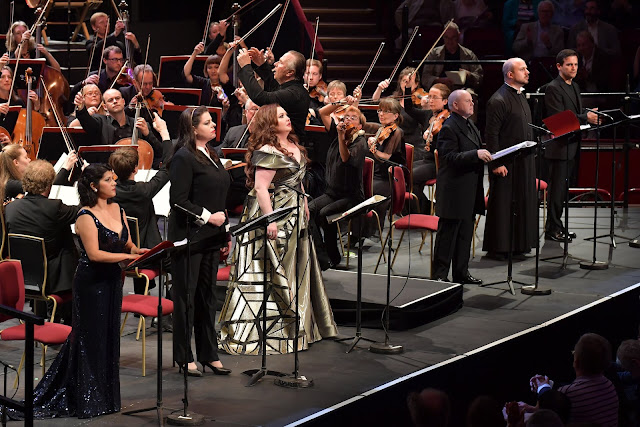 |
| Albina Shagimuratova as Aspasia - Mozart: Mitridate Re di Ponto - Royal Opera House 2017 (Photo (c) ROH, Bill Cooper) |
 |
| Albina Shagimuratova (Photo Pavel Vaan / Leonid Semenyuk) |
Singing Semiramide at the Proms in 2016 was a huge challenge and she is grateful to both Mark Elder and the OAE, and she feels that she learned so much from Mark Elder. The opera was performed (and recorded) complete which is something that has almost never been done. Albina points out that even Isabella Colbran (for whom Rossini wrote the role) made changes, but the whole idea of the performance and the recording was do to it exactly as in the score. She found singing at the Proms a fantastic experience, she finds singing in London very special and the response of the audience at the Royal Albert Hall was terrific.
Many colleagues think of Albina was a working machine with all of her high notes and coloratura, but she likes to bring character and drama on stage. She enjoyed her period working on Mitridate with Graham Vick, describing him as her type of stage director, everything he did came from the score, he does not create 'something crazy'. In Mitridate there are lots of recitatives, and she worked extensively on these with him over the three week rehearsal period, and she comments that he never let her be empty on stage, she was always Aspasia. She also comments on the superb cast that they had (Michael Spyres, Lucy Crowe, Bejun Mehta), and she found the whole experience very enjoyable. She is also complimentary about the Royal Opera House Orchestra, calling it one of the great orchestras of the world.
 |
| Albina Shagimuratova as Queen of the Night - Mozart: Die Zauberflote Royal Opera House 2013 (Photo Mike Hoban) |
The role of Semiramide sits a little low for Albina, and she did add some high notes. She comments that she would not have accepted the role earlier in her career. It is thanks to her pregnancy in 2014 (she and her husband have a daughter called Adelina) that her voice has got bigger in the lower register without affecting the top, she is still singing the Queen of the Night, though she will be finishing with the role next year (when she will have been singing it for 10 years). But her middle range is stronger, more secure and her breath control is stronger.
She thinks that Mozart is healthy for the voice. She currently also sings Donna Anna in Don Giovanni (a role she sang at Covent Garden in 2015, see my review), and Konstanze in Die Entfuhrung aus dem Serail, and she would love to do Fiordiligi in Cosi van Tutte on day. In Albina's opinion, most sopranos take on the role of Fiordiligi way too early. Fiordiligi is a demanding part, that needs to be well sung and ideally the soprano should already have experience of singing the Countess (in Le nozze di Figaro).
 |
| Albina Shagimuratova as Donna Anna Mozart: Don Giovanni Royal Opera House 2015 (Photo Mike Hoban) |
In addition to Mozart, and what she describes as her crazy ladies (Donizetti's Lucia di Lammermoor, Elvira in Bellini's I Puritani) she also sings in her native Russian, including Rimsky Korsakov's The Tsar's Bride. She would love to sing more French repertoire, and bemoans the fact that Delibes Lakmé is not more often done. She tends to learn two new role per season, she does not find it too difficult learning these complex roles. She learned Aspasia in three weeks, studying six hours per day. At the beginning, if she does not know a part, she listens to recordings so see what is going on but does not listen whilst she is learning.
She was born in the Soviet Union in an area which, after the collapse of the Soviet Union became Uzbekistan. The collapse of the Soviet Union was not an easy time for her family, and her father decided to move to Russia; she feels that this was the right decision looking back, because her relatives still in Uzbekistan still struggle, and she would not now have a career as an opera singer if she had stayed. She studied at the Moscow Tchaikovsky State Conservatoire and now lives in Moscow.
 |
| Albina Shagimuratova as Lucia Donizetti: Lucia di Lammermoor Teatro alla Scala 2014 (Photo Brescia / Amisano) |
In future she would love to sing Bellini's Norma and Donizetti's Tudor Queens (Anna Bolena, Elisabetta in Roberto Devereux and Maria Stuarda). This is her style of repertoire, having sung so many Queens she does not feel that Gounod's Romeo et Juliette is for her, it is neither her style nor her character. But she is currently in discussions with the Royal Opera about possible future roles.
Looking ahead she is about to return to Russia to sing Donna Anna in Don Giovanni at the Mariinsky Theatre with Valery Gergiev conducting, and next year will make her stage debut in the title role of Rossini's Semiramide at the Bayerische Staatsoper in Munich (in the production which comes to Covent Garden in the Autumn with Joyce DiDonato in the title role). Albina will make her role debut as Elvira in Bellini's I Puritani at Chicago Lyric Opera in early 2018. Plans also include a final Queen of the Night in a special production, as well as a recording of Mozart's Die Zauberflote for Deutsche Gramophon, with conductor Yannick Nezet-Seguin. She will also be doing Violetta in La Traviata in Houston in September. She has has sung Violetta before and sometimes likes to return to roles. She does not find Violetta technically challenging to sing, but loves the character as an actress, she is such an interesting woman, and there is so much to find in the role, so many colours.
Once, when she was at the Met in New York, singing Konstanze in Die Entfuhrung, James Levine told her than when she was 45 or 50 she would sing the title role in Turandot, she laughed and said Liu perhaps, but Levine insisted but all she says is 'We will see'. Whilst Musetta in Puccini's La Boheme is a role which she sang as a student, she would love to explore Puccini further, and is interested in Mimi (in La Boheme). Regarding Madama Butterfly she says not yet, but maybe one day. Puccini is, for her, a different technique, and this applies to much of Verdi too. She thinks perhaps that in seven or eight years she might be able look at Desdemona (in Otello) or Luisa Miller. She had an offer to do Abigaille in Nabucco three or four years ago, but she said no; this is a role for a real dramatic soprano.
Elsewhere on this blog:
- Neglected drama: Andre Tchaikowsky's The Merchant of Venice - Opera review
- Over There! London English Song Festival evoke the American entry into World War One - concert review
- Captivating: Leoncavallo's Zaza - Opera review
- Choir and brass: Lassus Requiem a 5 from Girton College and Guildhall School - CD review
- Strong ensemble, intense drama: Janacek's Kat'a Kabanova at Opera Holland Park - Opera review
- Armenian remembrance: Tigran Mansurian's Requiem on ECM Records - CD review
- Exploring her lyrical side: I chat to soprano Natalya Romaniw - interview
- Stravaganza d'amore Raphael Pichon & Pygmalion in early Florentine Intermedi and opera - CD review
- Debut disc: Perfido, concert arias by Mozart, Haydn, Beethoven, from Ian Page, The Mozartists & Sophie Bevan - CD review
- Vibrant performances: Gillian Keith & Armonico Consort in Bach cantatas - CD review
- Not quite a classic: Puccini's Turandot at Covent Garden - Opera review
- Remarkable encounter: Iestyn Davies in Schubert's Die schone Mullerin - concert review
- Home




.jpg)







No comments:
Post a Comment